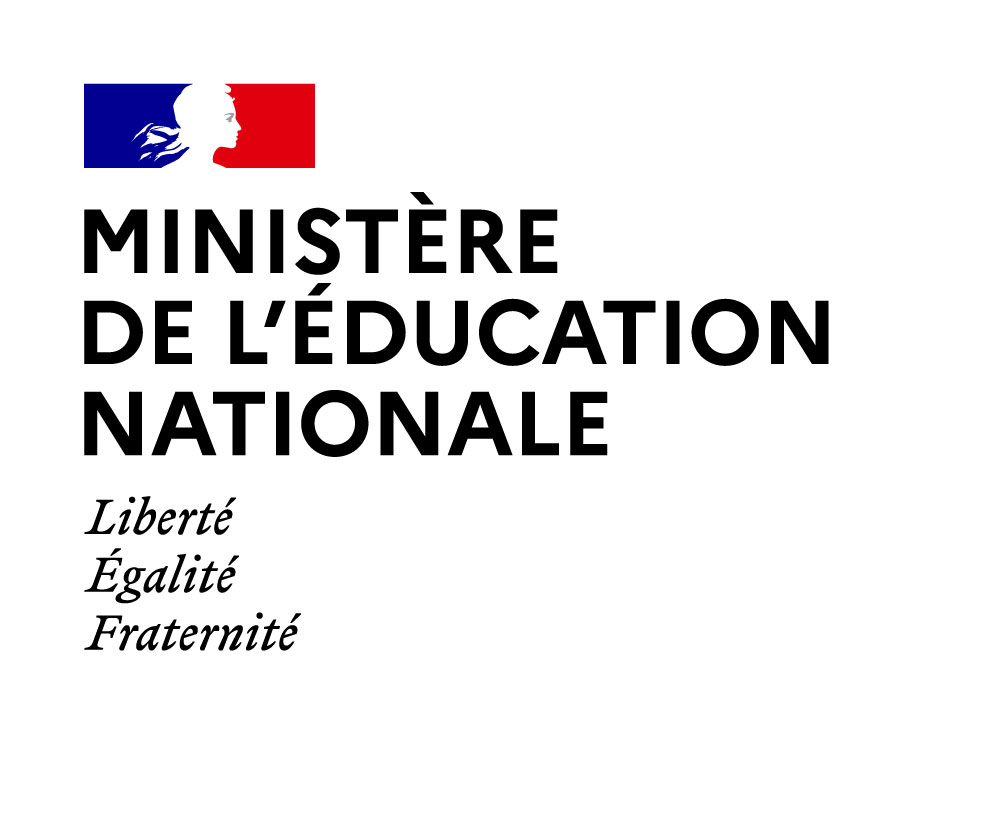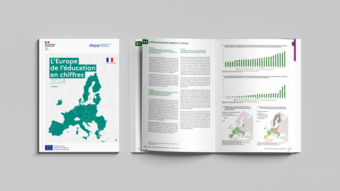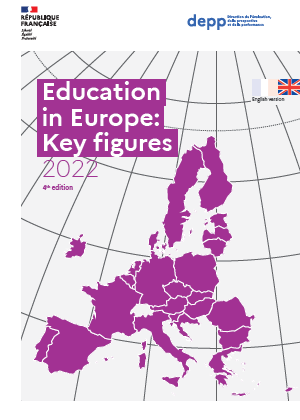
Studies and statistics on education in France and in Europe
In the context of the French Presidency of the European Union, the DEPP presents in this article a selection of works on education in France and in Europe.
About the DEPP
The Directorate of Evaluation, Forecasting and Performance Monitoring (DEPP) is both:
- a directorate of the Ministry in charge of national education and, as such, it participates fully in the Ministry's work and discussions
- the ministerial statistical service in charge of education statistics and, as such, it is part of the French and European public statistics. Its activities are monitored by the Public Statistics Authority. The Depp complies with the principles of the European Statistics Code of Practice (independence, integrity, accountability, relevance).
This dual position ensures relevance, objectivity and responsiveness of the statistics and studies produced by the DEPP.
Finally, the DEPP is the national authority for the production of European statistics in the field of education. The DEPP is recognized by Eurostat as an "ONA" (Other National Authority): as such, it is responsible, alongside the National Institute of Statistics, for "the development, production and dissemination of European statistics".
Click here for more information about DEPP's missions.
Education in Europe
International comparisons play an increasingly important role in public debate and policy support in the field of education. It is therefore necessary to master their quality and relevance in order to use them wisely and to draw valid interpretations from them. The DEPP has long chosen to be involved, through its technical and statistical expertise, in the construction and production of international data, but also in their appropriation by public actors and the educational community as a whole. It includes international comparative data in its publications and publishes studies such as Education in Europe: Key Figures, which provides a set of indicators on most common dimensions of the education systems in the European Union.
DEPP contributes to the development of international education indicators. To this end, it collaborates actively within the networks of the OECD, the European Commission (and Eurostat in particular), UNESCO and the International Association for the Evaluation of Educational Achievement (IEA). In France, it pilots the international surveys on student skills, PISA with the OECD, TIMSS, PIRLS or ICILS with the IEA, and the TALIS survey on teachers with the OECD.
Education in Europe: Key Figures, 2022 edition

Through Education in Europe: Key figures, the DEPP offers a complete panorama of indicators and analyses to appreciate the results but also the diversity of the modes of organisation of schooling in the European Union, and to situate France in relation to its neighbours.
The following major themes are covered: the organisation of schooling, the main stakeholders in education (students, parents, teachers), the performance of education systems and the social and economic impact of education.
New analyses have been added to these themes, in particular those on upper secondary vocational education and on education for environmental issues. An additional fact sheet, developed in collaboration with the European network Eurydice, provides information on the reception of refugees from Ukraine in education systems in the European Union.
European targets in education
The European Union has set new education and training targets for 2030
In early 2021, as the Education and Training 2020 strategic framework ceased to be in effect, the European Union set new targets for 2030. At this stage, the average performance of the 27 EU Member States is lagging behind on each of the targets, especially behind the ones on students’ skills. Compared with the results of EU countries, France has more young children in education, fewer early school leavers and higher access to tertiary qualifications. It has also already exceeded collective targets in these areas. However, in terms of literacy, France, like almost all European countries, is behind the common target for 2030.
Note d'Information n° 21.25, May 2021, DEPP.
Thematic studies on education in Europe
- The Europe of education - A territory with multiple and evolving profiles, Review Education & formations, n°102, June 2021, DEPP.
- "Sustainable Development Goal on education: where do girls and boys stand?", Note d’information n° 21.13, March 2021, DEPP.
- "Teachers careers in europe", Note d'information n°19.19, June 2019, DEPP.
Eurydice: European network on education systems

DEPP also contributes to putting European statistics into perspective, to the exchange of information between the countries of the "Erasmus +" programme and to the comparison of their education systems. In this context, it plays an active part in the Eurydice network and coordinates the work of experts who participate in the network's international reports on behalf of France.
Click here for more information about Eurydice's studies
The 2020 health crisis and its impact on education

In order to shed light on the consequences of the 2020 health crisis, the DEPP's priority was to establish objective findings, but also to evaluate the impacts and account for inequalities. To do this, the DEPP has put in place different approaches. In May 2020, it conducted seven specific surveys among the families of pupils of the various actors in the education system: teachers, school heads, chief education advisors and inspectors. In addition, it has added a crisis-specific section to the existing statistical systems (pupil panels, exhaustive national assessment, etc.). The first results from these various sources were published in 2020 and 2021 (more will come later).
Click here for more information about the evaluation of the consequences of the health crisis conducted by the DEPP.
The DEPP's studies on the effects of the health crisis in France
- "A device to assess the consequences of the health crisis: how did pupils experienced the March-April 2020 lockdown?", Note d'Information n° 21.19, April 2021, DEPP.
- "Placement test for the beginning of tenth grade class in 2020: improved performance in French, but results still vary according to the characteristics of the students and the schools", Note d'Information n° 21.17, March 2021, DEPP.
- "800,000 students evaluated at the beginning of the sixth grade in 2020: performance is on the rise, but still varies according to student characteristics and schools", Note d'Information n° 21.03, January 2021, DEPP.
- "Health crisis of 2020 and pedagogical continuity: the students have learned satisfactorily", Note d'Information n° 20.26, July 2020, DEPP.
- "Health crisis of 2020 and pedagogical continuity: results of a national survey of secondary school teachers", Document de travail - série études, n°21.E05, Novembre 2021, DEPP. (Summary)
Education system in France
General Overview
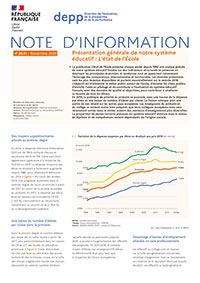
Each year, this publication presents an overall analysis of the French education system based on structural and permanent indicators, describing the main developments and trends, while highlighting international and territorial comparisons.
"Overview of the French Education System: The State of Education", Note d'information n°20.41, November 2020, DEPP.
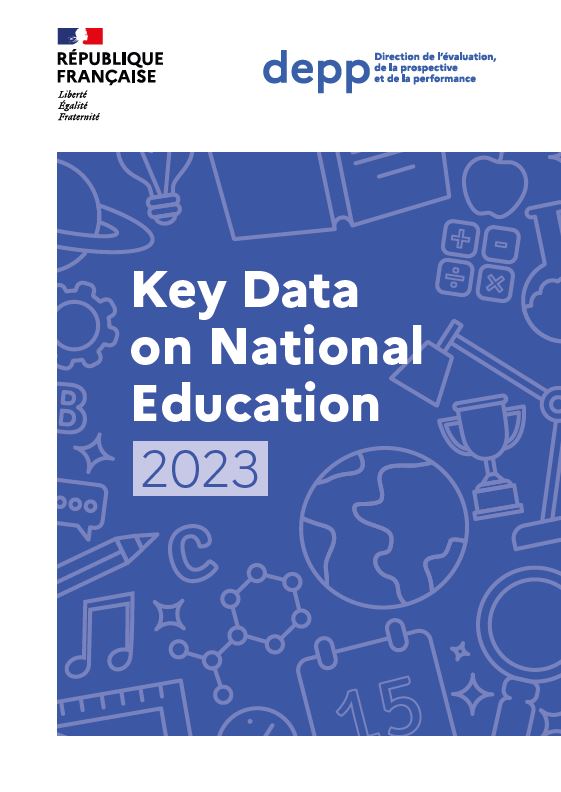
This summary of the characteristics and trends of the French education system presents the main key figures for the current school year: the school population, the number of teachers, investment, the share of the public and private sectors, the diplomas awarded, the integration of young people into the labour market, national and international assessments, and schools.
Key Data On National Education 2023, 2023 edition, DEPP.
Students and apprentices
Each year, the DEPP takes a census of all students and apprentices, and forecasts the expected developments over the next five years. It describes the training they receive and their examination results. It also conducts a large number of surveys among students and their parents, to find out about their backgrounds and relate these to their living conditions. This enables it to analyse pathways, factors of school success, social inequalities and territorial disparities. The DEPP designs and implements standardised assessments of pupils, whether exhaustive or based on a sample, national or international. Thanks to these sources, the DEPP can have multiple "views" on the achievements of pupils just as it can report on the performance of the French education system over time and in comparison with other countries
The DEPP's studies on students and apprentices :
- "Numbers of pupils per hour of instruction in a secondary school in 2020", Note d'information n°21.47, December 2021, DEPP.
- "Entering the labour market for high school students from CAP to BTS level 6 months after leaving the education system in 2020", Note d'information n°21.42, December 2021, DEPP.
- "Entering the labour market for apprentices from CAP to BTS level 6 months after leaving the education system in 2020", Note d'information n°21.43, December 2021, DEPP.
Teachers' working conditions
Teachers' well-being at work can be assessed based on numerous survey data collected by the DEPP. These data refer to their feelings about the impact of their job on their health, the quality of social relations in the exercise of their profession (including the school climate and the classroom climate), their job satisfaction, their sense of personal effectiveness or the stress and exhaustion associated with the performance of their duties.
The DEPP's studies on well-being and teacher salaries
- "First results of the Barometer on occupational well-being among school staff in the French education system", Note d'Information n° 22.31, octobre 2022, DEPP.
- "Job satisfaction and well-being of primary school teachers: results of the 2018 TALIS survey", Note d'information n°21.34, september 2021, DEPP.
- "Teacher well-being: what does the DEPP data tell us?", Document de travail - série synthèses, n°21.S01, juin 2021, DEPP.
School climate
The school climate’s analysis sheds light on the quality of relations and teaching, as well as on the environment and the feeling of safety and belonging. In the Spring of 2021, a statistical survey of school climate and victimisation was conducted for the first time in primary education among pupils in grades 4 and 5, as well as among staff in national education schools. Since 2011, the DEPP has regularly conducted this type of surveys among secondary school students. In Spring 2019, a survey was conducted for the first time among secondary school staff. All these surveys have a dual objective: to assess the school climate and to measure any harm suffered, whether or not these acts have been reported inside the schools or to the academic, police, judicial or administrative authorities. In addition, the staff surveys have addressed issues of working conditions in schools since the beginning of the school year.
The DEPP's studies on school climate
- "Results of the first school climate and victimisation survey among fourth and fifth grade French pupils: 92.4% of them say they feel ‘good‘ or ‘very good‘ in their school", Note d'information n° 22.08, mars 2022, DEPP.
- "Results of the first school climate survey among secondary school staff in the French education system", Note d'information n°19.53, December 2021, DEPP.
- "Results of the school climate and victimisation survey among high school students for the 2017-2018 school year", Note d'information n°18.33, Décember 2018, DEPP.
Performance indicators of upper secondary schools (IVAL)
In France, the valued-added indicators for lycées (IVAL) measure the ability of secondary schools to support their pupils until they obtain the baccalaureate (A-level). Since 1993, the DEPP disseminate results in this area to the general public. In addition to the examination pass rate alone, the ‘added values’ associated with the raw indicators facilitate comparisons between heterogeneous schools, by taking account of educational and socio-economic disparities between schools. Since the creation of the IVALs, in principle unchanged, the methodology has evolved, adapting to institutional challenges and available data. Although sophisticated, it has been chosen in such a way as to be understandable to the general public.The release of the indicators is a media event that also contributes to their informed dissemination. The media, which used to produce rankings based solely on the gross success rate, are now moving more towards plural approaches. As a result of this pedagogy, the philosophy of the IVALs is becoming better and better understood, both within the Ministry and externally. Although institutional skateholders are already using them for the education steering purposes, this should be even more the case in the future, with a view to the overall evaluation of secondary schools.
The philosophy of IVAL since their first release in 1993 and the different uses to which they are implemented :
- Performance indicators of upper secondary schools (IVAL) - Courrier des statistiques n°5, 2020, Insee.
Professional integration (InserJeunes)
The InserJeunes information system calculates and disseminates each year and at the level of each school (when the number of students is sufficient), the following indicators: the rate of continuation of studies; the rate of interruption during training; the rate of employment of school leavers from the school concerned, following the training provided; the added value of the school given this employment rate. The InserJeunes information system also disseminates, for apprenticeship training centres, the proportion of apprenticeship contracts interrupted before their end.
InserJeunes makes it possible to come close to exhaustiveness and to construct integration indicators at very fine levels. These indicators are available for young people, 6 months after the end of their studies. The employment rate indicator is also calculated at 12, 18 and 24 months.
The DEPP's studies from the InserJeunes system:
- "Entering the labour market for high school students from CAP to BTS level 6 months after leaving the education system in 2020", Note d'information n°21.42, December 2021, DEPP.
- "Entering the labour market for apprentices from CAP to BTS level 6 months after leaving the education system in 2020", Note d'information n°21.43, December 2021, DEPP.
Territorial inequalities and segregation
Knowledge of territories is essential for understanding educational policies and their results, and for steering these policies in the different national territories. The DEPP produces a wide variety of indicators and analyses on the education system, which are broken down by territory in order to confront the multiple dimensions at stake in educational success. The publication 'Géographie de l'École' provides indicators offering a mapped view of our education system, with its specificities and characteristics according to territories. The DEPP regularly invests in new methods and approaches to shed light on educational policies and provide steering tools that take territorial disparities into account. In recent years, this methodological investment has resulted new tools for characterising territories, such as the typology of urban and rural municipalities.
- "Changes in the social mix of French lower secondary schools", Note d'information n°22.26, juillet 2022, DEPP.
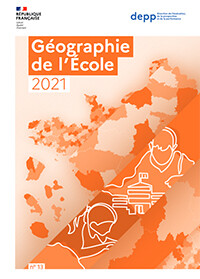
How are French students distributed throughout the country? Does class size vary on the territory? Where is private education least established? Where are located boarding schools? Is the expectation of obtaining the baccalaureate the same across the country?
"Géographie de l’école 2021" answers these questions and describes the education system by highlighting territorial inequalities. The 36 thematic sheets provide a variety of information in the form of maps illustrating different indicators, combined with short analysis. They include, among other subjects; the distribution of students, their economic, social and family environment, the school context, the means and human resources implemented, educational pathways and results. Observation scales vary according to the administrative mesh, the phenomena presented and data availability. Lastly, a brief offers a study of territorial inequalities in terms of results and educational pathways.
"Géographie de l'école 2021", n°31, juin 2020, DEPP, (French version).
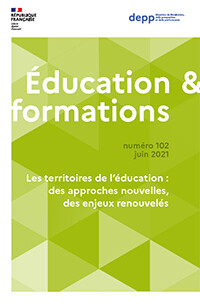
Knowledge of territories is essential for understanding educational policies and their results, as well as for the implementation of these policies in the territories. This special issue of the review "Éducation & formations" contributes to this by proposing a series of innovative articles on a number of subjects: characteristics of education provision and school population; student pathways and results; characteristics of teachers, conditions of practice and professional practices.
"The territories of education: new approaches, renewed challenges", Introduction to Issue N°102 of Éducation et Formations, June 2021, DEPP.
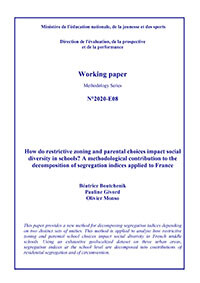
This paper provides a new method for decomposing segregation indices depending on two distinct sets of unities. This method is applied to analyse how restrictive zoning and parental school choices impact social diversity in French lower secondary schools. Using an exhaustive geolocalized dataset on three urban areas, segregation indices at the school level are decomposed into contributions of residential segregation and of circumvention.
How do restrictive zoning and parental choices impact social diversity in schools?, Working paper n°2020-E08, 2020, DEPP
Investment in education
The DEPP pays particular attention to the importance of investment in education and approaches it from a broad perspective. Its Education Account, which exists since the late 1970’s, makes it possible to bring precise and accurate answers to the questions of what the cost of education is, which economic agents provide the funding or what the average expenditure per pupil or student for a given level or pathway is. The Depp also studies particular factors of expenditure and their evolution over time, for example, the number of pupils per teacher. Finally, it sheds light on the effectiveness of investments in large-scale interventions and policies, for example those related to the use of certain digital equipment or to the class-size reduction.
The DEPP's studies on investment in education:
- "Class size in primary education: the decline continues due to the impact of reducing the last grade of pre-primary classes", Note d'Information n° 22.02, janvier 2022.
- "Impact of reducing the number of pupils in French first-grade and second-grade classes in reinforced educational priority networks (REP+): evaluation of the effect on pupils' performance and teaching practices", Document de travail - série études, n°21.E04, September 2021, DEPP. (Summary)
- The Education Account - Principles and methods, DEPP reports, n°206, DEPP.
- "In primary education, class size continues to decrease in the school year 2020", Note d'information n°21.01, January 2021, DEPP.
- "Multi-dimensional evaluation of the impact of mobile digital equipment on student learnings: Preliminary results of the effects", Note d'Information n° 21.05, Febuary 2021, DEPP.
Mise à jour : décembre 2023
